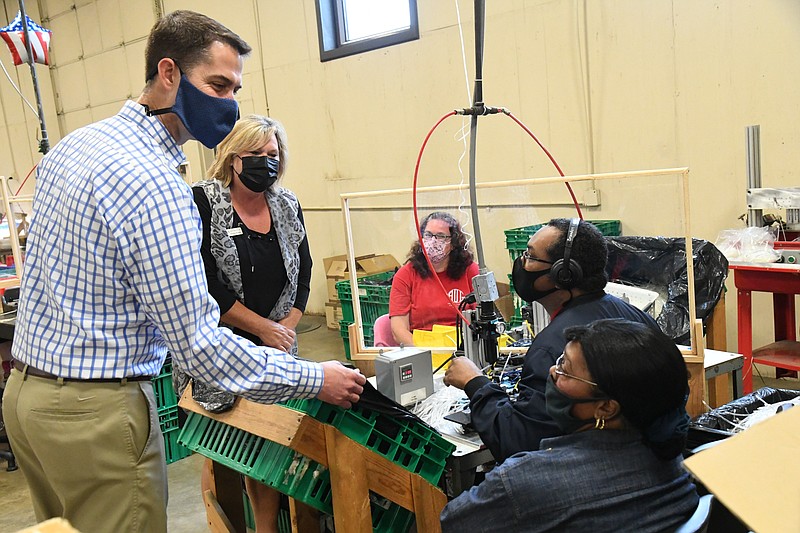U.S. Sen. Tom Cotton, R-Ark., voicing his long support for organizations such as Abilities Unlimited Inc. in Hot Springs and the U.S. Department of Labor provisions that allow them to operate, visited the local facility Tuesday and pledged to continue to fight for them.
Karen Kight, executive director of Abilities Unlimited in Hot Springs, located at 530 Mountain Pine Road, told those gathered for Cotton's visit that he has "been a true champion for our type of work programs."
Cotton told The Sentinel-Record his visit to Abilities "is really a sign of how Arkansans help me do my job for them in Washington," noting that a few years ago a group of sheltered workshops in the state came to him concerned about an effort underway to eliminate the programs.
The opponents want to eliminate the "federal wage provisions that allow sheltered workshops to give a good, productive place to work for adults with disabilities while paying them a wage that's below the federal minimum wage, but allows them to operate in an economically viable fashion," Cotton said.
"At that point, I stood up to stop that legislation because these sheltered workshops are not just a place where economic work is done, it's a place where adults with disabilities can get outside their home, have a sense of belonging, build friendships, have good social relationships," he said.
Video not playing? Click here https://www.youtube.com/embed/lZ617Xvfu8c
The minimum wage debate "is very hot again in Washington" and Cotton noted he has proposed legislation that would raise the minimum wage to $11 while pairing it with mandatory E-Verify usage "to make sure higher wages are going to American workers and not illegal immigrants."
E-Verify is a U.S. Department of Homeland Security website that allows businesses to determine the eligibility of their employees, both U.S. and foreign citizens, to work in the United States, according to its website.
Cotton's proposal would also "preserve things like the sheltered workshop wage so these places can continue to operate," he said, noting it involves a "long-standing provision of federal law."
Section 14(c) of the Fair Labor Standards Act authorizes employers, after receiving a certificate from the Wage and Hour Division, to pay special minimum wages -- wages less than the Federal minimum wage -- to workers who have disabilities that impair their productivity for the work being performed, according to the U.S. Department of Labor website.
Cotton also seeks to preserve tip wages for restaurants and bars "that for some reason some liberal Democrats want to do away with even though pretty much all the waiters and waitresses and bartenders I talked to love the tip wage. It ends up giving them a lot more income after the fact once you factor in all their tips."
Speaking to the Abilities clients and guests, including several members of Hot Springs' state legislative delegation, who stopped by in conjunction with his visit, Cotton said, "I can promise you I will continue to be a champion for you as long as I'm serving you in Washington, D.C. I love my visits to these sheltered workshops. It's a highlight of the year for me. It's always an uplifting and rewarding experience to come here."
Asked by Kight what they could do to help preserve the programs, Cotton said, "This is probably not a battle we win, but a problem we have to manage over the years," noting there are some who are "ideologically opposed" to the programs they offer and "they are never going to throw in the towel."
Cotton said Hot Springs and Arkansas "have a good Congressional delegation in Washington in my opinion" who all support the 14-C programs so "the best thing you can do is work with your counterparts in other states, especially those with Democratic senators who are open minded about such things and might support our efforts."
"Work through your counterparts and national organizations to advocate for the programs where it can make a difference," he said, focusing on those states where the representatives are "undecided or undeclared."
Kight noted some people have referred to their programs as "modern day slavery," and Cotton told her, "That's obviously wrong and an incendiary claim, but it's not surprising what you say."
Stephanie Price, a client of the Abilities Unlimited in Van Buren, stood up and told Cotton, "For us, work is a safe place. It's a place we choose to go to. It's not forced upon us. Could we get another job in the community? Probably. But it wouldn't be safe. It wouldn't be what we chose.
"No one put a gun to our head and made us work here. We chose it. Because we love it and it makes us excel at what we love. Makes us be more outspoken and want to do more things. So we have a voice and have a chance to be anybody else."
The 14-C program "allows you to have individualized plans," Cotton said. "If they want to do away with 14-C it will be over my strong opposition. So far, we've succeeded."

